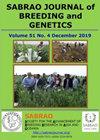哈萨克斯坦东南部基于耕作制度的结构-团聚体组成和土壤抗水性
IF 1.6
Q3 PLANT SCIENCES
引用次数: 0
摘要
在哈萨克斯坦东南部的春小麦和大麦种植中,旱地的促进和合理开发采用了两种耕作制度(犁耕至20-22厘米和免耕)。结果表明,免耕方案有助于形成春小麦和大麦耕层良好的团聚状态(65% ~ 69%)。免耕土壤的抗水团聚体最高(19.3% ~ 21.8%),说明土壤结构的抗水能力不理想。提高抗水性团聚体需要使用有机肥来改善多年生草、绿肥和覆盖作物的建立。免耕制度有利于将土壤密度从1.19 ~ 1.23 g/cm3的疏松微密状态提高到1.32 ~ 1.39 g/cm3的致密状态。根据作物品种和耕作方式的不同,春小麦和大麦籽粒产量在2.84 ~ 3.89 t/ hm2之间。高产量来自春大麦品种Symbat。春耕水平在20 ~ 22 cm时表现良好,免耕仅差0.25和0.15 t/ hm2。双因素方差分析表明,品种对春小麦和大麦籽粒产量增加的贡献取决于研究作物季节(年-环境)的份额(40.9% ~ 62.2%)和耕作制度(22.4% ~ 32.2%)。粮食产量的形成对所研究的作物及其品种的依赖性更强,并且由于作物期间的天气条件,这种依赖性随着作物季节的增加而增加。本文章由计算机程序翻译,如有差异,请以英文原文为准。
STRUCTURAL-AGGREGATE COMPOSITION AND SOIL WATER RESISTANCE BASED ON TILLAGE REGIMES IN SOUTHEAST KAZAKHSTAN
The promotion and rational development of drylands employed two tillage regimes (plowing to 20–22 cm and no-till) during the spring wheat and barley cultivation in Southeast Kazakhstan. The results established that the no-till scheme contributed to forming an excellent aggregate state of the arable soil layer for spring wheat and barley (65%–69%). The water-resistant aggregates were the highest with no-tillage (19.3%–21.8%), indicating the unsatisfactory water resistance of the soil structure. Enhancing the water-resistant aggregates requires using organic fertilizers to improve the establishment of perennial grasses, green manuring, and cover crops. No-till system inclined to boost the optimal soil density from a loose and slightly compact state of 1.19–1.23 g/cm3 to a dense 1.32–1.39 g/cm3. According to crop cultivar and tillage methods, the spring wheat and barley grain yield varied between 2.84 and 3.89 t/ha. High grain yield came from the spring barley cultivar Symbat. Spring showed promising performance when the plowing level was 20–22 cm and inferior only by 0.25 and 0.15 t/ha with no-till. Based on the two-factor analysis of variance, the cultivar contribution to the spring wheat and barley grain yield buildup depended on the shares of crop season of the research (year – environment) (40.9%–62.2%) and the tillage regimes (22.4%–32.2%). The grain yield formation was more dependent on the studied crops and their cultivars, and the dependence increased over the crop seasons due to weather conditions during the crop period.
求助全文
通过发布文献求助,成功后即可免费获取论文全文。
去求助
来源期刊

Sabrao Journal of Breeding and Genetics
农林科学-奶制品与动物科学
CiteScore
1.90
自引率
50.00%
发文量
63
期刊介绍:
The SABRAO Journal of Breeding and Genetics is an international journal of plant breeding and genetics research and was first published in 1969. It is the official publication of the Society for the Advancement of Breeding Research in Asia and Oceania (SABRAO).
Its objectives are to: promote the international exchange of research information on plant breeding and genetics, by describing new research findings, or ideas of a basic or practical nature; and be a medium for the exchange of ideas and news regarding members of the Society.
The Journal gives priority to articles that are of direct relevance to plant breeders and with emphasis on the Asian region. Invited for publication are research articles, short communications, methods, reviews, commentaries, and opinion articles. Scientific contributions are refereed and edited to international standards.
The journal publishes articles for SABRAO members mainly. The Journal preferred strongly that at least one author should be a current member of the Society. Non-members may also publish in the journal.
 求助内容:
求助内容: 应助结果提醒方式:
应助结果提醒方式:


